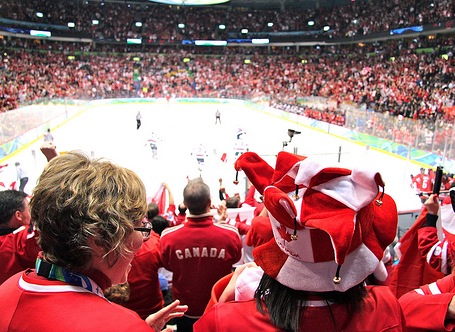Quick, before this hockey crisis goes away, I’d like to act quickly to try and wrestle some ideas from it, instead of wasting it.
What’s eternally awesome is the way individual souls meld with their team. The identification is local, not national, except for rare Olympian moments. And it’s with the team, not just players and definitely not owners. It transcends generations and absences. I once left Toronto for 10 years, pre-Internet when it was harder to keep contact, and when I returned I picked up exactly the same feelings of frustration with the Leafs and Argos as before, although entire rosters had been replaced, like the cells of a human body every seven years. The ongoing agony was seamless.
Yet this sense of ownership that a community feels deep in its historical, even genetic structure, is reflected nowhere in the economic structures. We’re practical outsiders to entities we care deeply about, something that would be intolerable if it was also the case with, say, our kids. Could it be different?
In fact it was. Many of these teams began as community owned. The Argos were the 19th-century offshoot of a local rowing club. So were other teams. Among the survivors of that era are the Saskatchewan, Edmonton and Winnipeg CFL teams, all community owned, and haven’t suffered for it. It’s the opposite situation, private ownership, that leads to bizarre places. Think about the Edmonton Oilers. Owner Daryl Katz threatened to move them to Seattle, then apologized to local fans — what’s with that? Then he demanded even more extortionate gifts from city council than they’d granted, till they finally drew a line this week. Why does he get away with it, and the city accede? Because the team is the community in so many ways. Then why not just own it?
It can happen. The Green Bay Packers are community owned. That’s why they’re still in tiny Green Bay, Wisc. It hasn’t hurt them either. That’s now forbidden in the NFL but the Packers were grandparented in. British sportswriter David Conn recently sketched the situation in European football. Virtually all German teams are community owned by thousands of fans — “natural persons” vs. unnatural corporate persons — and can’t pay out profits or move. Companies like Audi can buy shares and receive PR benefits, but never a majority. This has led to more German players on German teams — 70 per cent — unlike top-tier English teams, which have a majority of “international” players. This in turn has undermined England’s national team. In Sweden and Turkey, all football teams are fan-owned, it’s the only ownership form allowed. Brazil is similar.
The beauty of these arrangements is they align the experiential reality (the team belongs to the community) with its economics. But why raise it now, aside from this being a moment of crisis (and no games to watch)? Is there really any chance of a different system? Well, such transformations do occur occasionally, when what had seemed set in stone crumbles. Print looked like an impregnable feature of culture for 500 years. Its absence was unthinkable. Then, in just the last decade and a half, it began to fade. Newsweek said this week it will cease print publication. With that perspective, can’t we at least entertain the possibility of different economic structures for beloved sports teams?
I’m not talking about state ownership. This is community ownership, a little like co-ops. Any “profits” can’t be taken out by individual owners; they go back into the team or community. Exactly what’s problematic in that?
You could build economic structures on those fan passions, confident that they won’t easily ebb away. Why not? Because feeling part of larger things is at our core. It’s based on real connections: to other generations for what they gave us (language, technologies) and even to the earth itself, which we take in (as food, air etc.) and to which we’ll return. Larger is us. Fandom is part of that, so is Leafs Nation. Instead of merely being devoured by those passions, why not work with and sculpt them so they become more lucid and practical? Leafs Nation: seize this moment! At least then you’d own your miserable fate.
Photo: Jeffery Simpson/Flickr
This article was first published in the Toronto Star.



